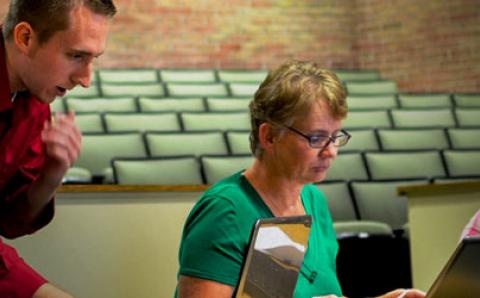Correction
In its "Highlights from 2012 Classis Meetings" (December 2012), The Banner incorrectly reported the status of Rev. Kevin Heeres. Rev. Heeres was released only from Parchment CRC when that church disbanded and is now heartily recommended to the churches for a call. We sincerely apologize for the error.
Can We Talk?
Mr. Vander Meulen writes, “As Christians, we hold dual citizenship” (“Can We Talk First?” October 2012). This idea suggests divided loyalties and purpose. The article rightly wants us all to practice love by agreeing to disagree, but the idea gives many validation of being of the world instead of just being in the world. I have heard many a Christian, in my visits to the U.S., declare they are Americans first and Christians second. This idea feeds this non-biblical thinking.
—Robert Bridgeo
Oshawa, Ontario
I would like to respectfully say that I am surprised that two huge issues weren’t covered in the dialogue between Edward Gabrielse and Kate Kooyman (“Can We Talk First?” October 2012). Abortion and gay marriage are subjects that Christians shouldn’t disagree on—the Bible is very clear that God, the defender of the defenseless, “formed” and “knew” us in the womb (Jer. 1; Job 31; Ps. 139) and that marriage is intended for one man and one woman (Gen. 2; Matt. 19; Eph. 5).
—Barb Henrickson
McBain, Mich.
Thanks, Peter Vander Meulen, for reminding us that as Christians we hold dual citizenship (“Can We Talk First?” October 2012), and Leon Schadelee (“Saving the Story,” October 2012) for showing us from Scripture that we are to turn neither to the left (liberal/Democrat) or to the right (Republican/conservative).
When I studied at Calvin College in the 1960s, I was a member of the Groen van Prinsterer Society. We tried to understand how all areas of life are under the sovereignty of God, including the political sphere. So we are politically active, serving God or an idol every week of our life. Voting is then a small token in that lifelong service. We learned that both the Democrats and the Republicans have Christian and unChristian roots, something that Christian historians will point out. Hence that so-called “political partisanship” is really small potatoes in the global historic kingdom of God. Jesus’ command to give unto God what is God’s and unto Caesar what is Caesar’s (Mark 12:17) will be exactly the same regardless of whether “Caesar” is Obama or Romney.
—Joe Reitsma
Cobourg. Ontario
Mr. Gabrielse states that banks collapsed because of the Community Reinvestment Act (passed in the 1970s) and because the government forced them to make loans to people without the means to pay them back (“Can We Talk First?” October 2012). This is a fundamental misunderstanding of the financial crisis. Twenty-four of the 25 top mortgage originators in 2006-2008 were not subject to the CRA. The banks failed because of human greed. He also states that he does not know of any conservative politician who would “scapegoat the most vulnerable.” I guess he is unaware of Mitt Romney doing just that when he called 47 percent of Americans lazy and takers (not makers). I expected more from an article like this than just the standard Republican talking points from one of the participants.
—Mark Sterenberg
Ada, Mich.
I agree that wholesome dialogue among Christians would be beneficial as we approach an important election in the United States (“Can We Talk First?” October 2012). I did find it disturbing that the right to life was not included in the article. Perhaps we as a denomination have decided to deem abortion a minor issue.
—Tom Vryhof
Grandville, Mich.
I read with great interest the article “Can We Talk First?” (October 2012). In Edward Gabrielse’s view, nearly half of the population is nonproductive or marginally nonproductive due to entitlements. But those receiving entitlements such as Social Security, Medicare, veterans’ benefits, and others are, for the most part, deserving. Becoming self-sufficient is not always a reality. I enjoy my entitlements that I have worked for and do not consider myself nonproductive. Privatizing is too risky and will not make the recipients self-sufficient. Welfare and Medicaid programs are necessary for the poor and sick.
Health care should not be considered a privilege but a God-given right. Health care is pro-life. There is no better investment than the welfare of our citizens.
—Herman Klap
Sahauarita, Ariz.
Whether you like it or not, some people will never be able to work even part time (“Can We Talk First?” October 2012). They should not have to live in poverty as though it were their fault that they are sick or handicapped. [We] need to show vulnerable people the compassion Christ would have shown them and provide decent living conditions for them. In this regard I am glad that I live in Canada.
—Michel Gyselinck
Montreal, Quebec
Saving the Story
Mr. Vander Lugt seemed to be saying today’s Christian youth cannot relate to or reject the essential elements of our Christian faith if we present them in an essential or non-negotiable context (“Saving the Story,” October 2012). Therefore the remedy is to be more open-minded, more open-ended, expand the category of gray area, and diminish the category of essential. I think that more than ever, today’s youth need more certainty, more clarity, and more examples of Christian role models who are so sure of their faith and beliefs that they would be willing to die for them. In today’s world it is easier to merge rather than stand out. Let’s pursue the latter.
—Jim Verwoerd
Abbotsford, British Columbia
Just War
Thank you to Lee Hollar for his article “Just War, Not Just Another War” October 2012). I am thankful for your calling the churches again to revisit and act upon the 2006 “War and Peace” report to synod. The first mandate of the committee was to review the literature and the moral reasoning called for by the Just War tradition. We discussed that question for many hours. Most of us were convinced that the Just War tradition continues to provide a moral arena/framework for discussing the use of military force. In his article, Hollar uses the principle of proportionality to frame his question about the massive destruction of our current wars. I find that I have a difficult time discussing moral issues in the conduct of war without principles like proportionality and discrimination.
Our conflicts in Afghanistan and Iraq are among the most morally ambiguous wars in our history, causing much moral damage to the men and women who conduct the battles. As a result, much discussion is taking place in the Department of Defense and the Veterans Administration as well as among therapists, ethicists, theologians, and counselors on moral injury in war. We should study these issues, because the damage to the consciences caused by this moral ambiguity is one of the causes of the spike in suicides among military people.
[The Department of Defense last June] stated that in the first 155 day of this year, 154 military persons committed suicide, and that we will average more than one suicide a day this year. That is more deaths by suicide than lives lost in combat. I weep because so few know these statistics. We can be complacent in our ignorance, while all around us soldiers and veterans are killing themselves. Eighteen veterans a day commit suicide.
We should examine as a church just how much we are like the churches in Nazi Germany. We don’t speak as a church because of our definition of the church’s role in the world. The church should not speak out on politics, yet our act of public worship is prophetic, evangelistic, and political. I find the CRC in the U.S. complicit in the injustices committed in these wars. We should examine ourselves in light of God’s Word and the 2006 report to synod. My hope is that at Synod 2013, we will be driven to repentance and publicly admit that we have been too silent about these wars.
—Chaplain Col. Herman Keizer, Jr.
U.S. Army, retired.







